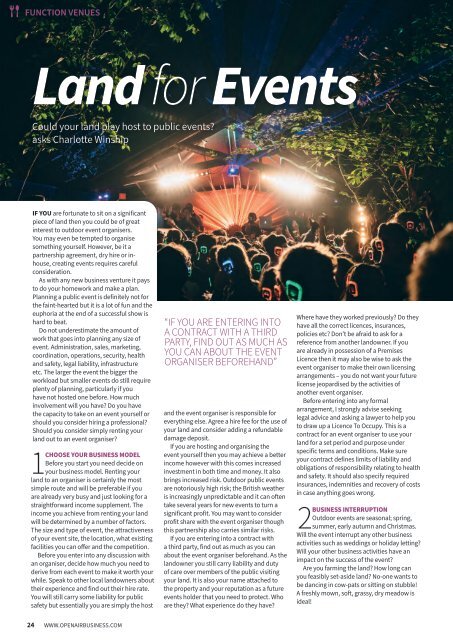July 2021
The UK's outdoor hospitality business magazine for function venues, glamping, festivals and outdoor events
The UK's outdoor hospitality business magazine for function venues, glamping, festivals and outdoor events
Create successful ePaper yourself
Turn your PDF publications into a flip-book with our unique Google optimized e-Paper software.
FUNCTION VENUES<br />
Land for Events<br />
Could your land play host to public events?<br />
asks Charlotte Winship<br />
IF YOU are fortunate to sit on a significant<br />
piece of land then you could be of great<br />
interest to outdoor event organisers.<br />
You may even be tempted to organise<br />
something yourself. However, be it a<br />
partnership agreement, dry hire or inhouse,<br />
creating events requires careful<br />
consideration.<br />
As with any new business venture it pays<br />
to do your homework and make a plan.<br />
Planning a public event is definitely not for<br />
the faint-hearted but it is a lot of fun and the<br />
euphoria at the end of a successful show is<br />
hard to beat.<br />
Do not underestimate the amount of<br />
work that goes into planning any size of<br />
event. Administration, sales, marketing,<br />
coordination, operations, security, health<br />
and safety, legal liability, infrastructure<br />
etc. The larger the event the bigger the<br />
workload but smaller events do still require<br />
plenty of planning, particularly if you<br />
have not hosted one before. How much<br />
involvement will you have? Do you have<br />
the capacity to take on an event yourself or<br />
should you consider hiring a professional?<br />
Should you consider simply renting your<br />
land out to an event organiser?<br />
1<br />
CHOOSE YOUR BUSINESS MODEL<br />
Before you start you need decide on<br />
your business model. Renting your<br />
land to an organiser is certainly the most<br />
simple route and will be preferable if you<br />
are already very busy and just looking for a<br />
straightforward income supplement. The<br />
income you achieve from renting your land<br />
will be determined by a number of factors.<br />
The size and type of event, the attractiveness<br />
of your event site, the location, what existing<br />
facilities you can offer and the competition.<br />
Before you enter into any discussion with<br />
an organiser, decide how much you need to<br />
derive from each event to make it worth your<br />
while. Speak to other local landowners about<br />
their experience and find out their hire rate.<br />
You will still carry some liability for public<br />
safety but essentially you are simply the host<br />
“IF YOU ARE ENTERING INTO<br />
A CONTRACT WITH A THIRD<br />
PARTY, FIND OUT AS MUCH AS<br />
YOU CAN ABOUT THE EVENT<br />
ORGANISER BEFOREHAND”<br />
and the event organiser is responsible for<br />
everything else. Agree a hire fee for the use of<br />
your land and consider adding a refundable<br />
damage deposit.<br />
If you are hosting and organising the<br />
event yourself then you may achieve a better<br />
income however with this comes increased<br />
investment in both time and money. It also<br />
brings increased risk. Outdoor public events<br />
are notoriously high risk; the British weather<br />
is increasingly unpredictable and it can often<br />
take several years for new events to turn a<br />
significant profit. You may want to consider<br />
profit share with the event organiser though<br />
this partnership also carries similar risks.<br />
If you are entering into a contract with<br />
a third party, find out as much as you can<br />
about the event organiser beforehand. As the<br />
landowner you still carry liability and duty<br />
of care over members of the public visiting<br />
your land. It is also your name attached to<br />
the property and your reputation as a future<br />
events holder that you need to protect. Who<br />
are they? What experience do they have?<br />
Where have they worked previously? Do they<br />
have all the correct licences, insurances,<br />
policies etc? Don’t be afraid to ask for a<br />
reference from another landowner. If you<br />
are already in possession of a Premises<br />
Licence then it may also be wise to ask the<br />
event organiser to make their own licensing<br />
arrangements – you do not want your future<br />
license jeopardised by the activities of<br />
another event organiser.<br />
Before entering into any formal<br />
arrangement, I strongly advise seeking<br />
legal advice and asking a lawyer to help you<br />
to draw up a Licence To Occupy. This is a<br />
contract for an event organiser to use your<br />
land for a set period and purpose under<br />
specific terms and conditions. Make sure<br />
your contract defines limits of liability and<br />
obligations of responsibility relating to health<br />
and safety. It should also specify required<br />
insurances, indemnities and recovery of costs<br />
in case anything goes wrong.<br />
2<br />
BUSINESS INTERRUPTION<br />
Outdoor events are seasonal; spring,<br />
summer, early autumn and Christmas.<br />
Will the event interrupt any other business<br />
activities such as weddings or holiday letting?<br />
Will your other business activities have an<br />
impact on the success of the event?<br />
Are you farming the land? How long can<br />
you feasibly set-aside land? No-one wants to<br />
be dancing in cow-pats or sitting on stubble!<br />
A freshly mown, soft, grassy, dry meadow is<br />
ideal!<br />
24 WWW.OPENAIRBUSINESS.COM


















